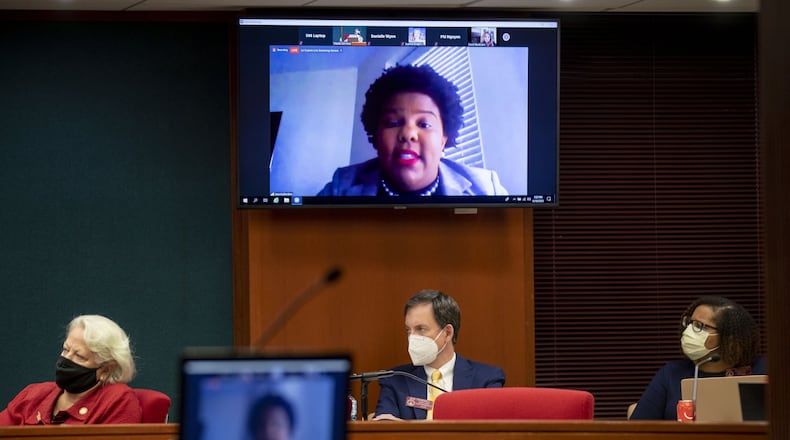From the moment Jacoria Borders showed up to be a poll worker, she said it was clear the Georgia primary would be a disaster.
Borders and other poll workers couldn’t get voter check-in computers working. Voter cards had to be repeatedly reprogrammed. Lines grew to three hours long.
"This election was a complete catastrophe," said Borders, whom Fulton County had hired just the day before to work at the short-staffed William Walker Recreation Center precinct. "We were totally unprepared and did the best we could."
Borders testified Thursday during a hearing at the Georgia Capitol to investigate problems with the state's June 9 primary, the first step in a process that could lead to changes in state law.
Lawmakers on the House Governmental Affairs Committee also heard similar stories from other poll workers, election observers, voters and election board members who recounted stories of problems in Fulton and across Georgia. No proposals were introduced Thursday to change election practices before November's election.
Election observers from Savannah said at their precinct, voting computers weren’t ready when polls were supposed to open, and the first ballot wasn’t cast until an hour later, after 8 a.m. on election day.
Voters weren’t allowed to cast backup paper ballots, and some of them left without participating in the election, said Joanna Shepherd, an election observer at a Salvation Army voting location.
“They didn’t seem to understand how to plug things in,” Shepherd said. “Things were clearly going wrong,” with few touchscreens operating and voter access cards often failing to pull up ballots.
Legislators heard many accounts of how problems piled up on election day. While voting went smoothly in some areas, 20 counties held precincts open past 7 p.m. to accommodate voters held up by lines.
Inexperienced poll workers didn't know how to work Georgia's new $104 million voting system. Precincts lacked enough backup paper ballots. Voters showed up in person because they never received absentee ballots in the mail. Social-distancing requirements created delays because only a few people were allowed to vote at a time.
Michelle Chaffee, a poll observer in Greene County, said election workers offered paper ballots to voters when check-in tablets didn’t work as polls opened. Some fed-up voters left and came back later.
“When those voters did return, the scanner wouldn’t accept their ballots, so they were issued provisional ballots,” Chaffee said.
Danielle Wynn, a poll observer in Rome, said poll workers told at least 20 voters to try to vote at a different precinct.
Voting touchscreens displayed error codes because of a connection problem with printers, and then the precinct ran out of backup paper ballots, Wynn said. The county elections office refused to deliver more provisional ballots.
“The poll workers and voters were cornered into a situation that left them in a state of frustration, uncertainty and chaos that was inexcusable,” Wynn said. “They were just telling people, ‘There’s no ballots.’”
House Speaker David Ralston, a Republican from Blue Ridge, ordered the committee investigation of the primary as complaints poured in on election day. Ralston has said legislation would probably come next year.
One elections-related bill is pending in the House, but it hasn't received a hearing since passing the Senate in March.
That proposal, Senate Bill 463, would require election officials to add precincts, poll workers or voting equipment if voters had to wait in line for more than an hour in the previous election. Democrats and voting rights groups oppose provisions of the bill that they say would shift responsibility from state election officials and introduce photo ID to absentee voting.
About the Author
Keep Reading
The Latest
Featured




